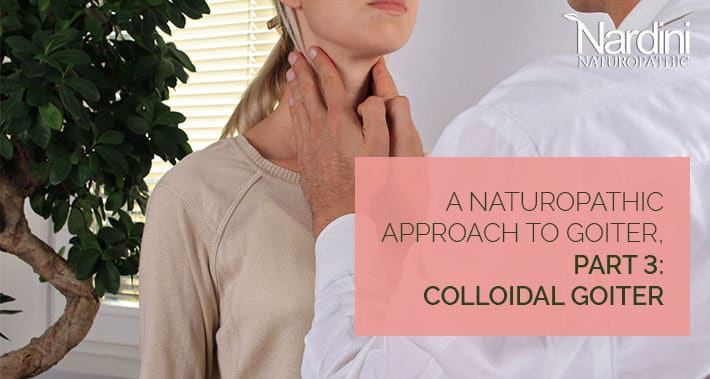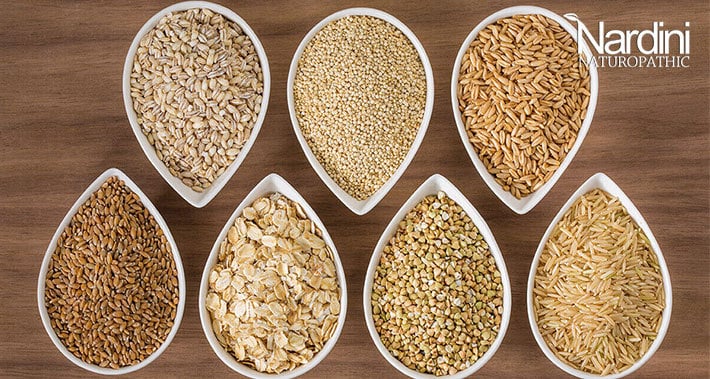Welcome to the last in our three-part series on goiter.
Today’s goiter is the colloidal goiter. We’ll cover some of the colloidal goiter treatments available through naturopathic medicine.
If you’re just coming to this series now, you may want to start with toxic multinodular goiter, and then nontoxic goiter – the first two articles on this topic.
Colloidal goiter is different than these two other types of goiter though, and as such, there’s a unique protocol for treatment.
Let’s take a look.
What Is A Goiter?
To recap, goiter is a condition that affects your thyroid, a small, butterfly shaped gland in the front of your neck.
Because your thyroid is responsible for so many different functions – your heart rate, mood, digestion, metabolism, and more – a thyroid condition can leave a significant impact on your health.
Goiter is an abnormal swelling of the thyroid gland and often comes with a host of other symptoms as well.
What Is A Colloidal Goiter?
Your body needs a certain amount of iodine in order to keep things running properly.
In particular, your thyroid needs iodine in order to produce thyroid hormones.
When there isn’t enough iodine for your thyroid, it may compensate by making itself larger and growing nodules.
Sometimes this can overcome mild deficiencies of thyroid hormone, temporarily.
At this point, there are two paths your goiter can take.
In some cases, once you begin getting enough iodine in your system, any nodules present in the thyroid may start producing thyroid hormone independently of what your thyroid produces.
This can lead to a condition called thyrotoxicosis – and at this point, your goiter is a toxic nodular goiter.
If the nodules don’t produce thyroid hormone independently, you have a colloidal goiter.
Symptoms of Colloidal Goiter
The telltale sign of a colloidal goiter, of course, is a swelling in the front of your neck, where your Adam’s apple would be if you have one.
Other than that, in a way, colloidal goiter can be considered more a symptom of a certain type of hypothyroidism rather than its own disorder.
So, if you’re experiencing any of the below symptoms, as well as the swelling, it may be colloidal goiter.
• Depression
• Chronic fatigue
• Constipation
• Slowed heart rate
• Weight gain
• Dry skin
• Dry hair and/or hair loss
• Menstrual irregularities
• Carpal tunnel syndrome
Risk Factors For Colloidal Goiter
Broadly speaking, the only people who cannot experience colloidal goiter are those who have had their thyroid removed as a result of thyroid cancer or other extreme thyroid issue.
Otherwise, you’re at greater risk for developing colloidal goiter if you fall into one of the following categories:
• You’re a woman
• You’re older than 40
• You don’t get enough dietary iodine
• You have a medical/family history of autoimmune disorders
• You’ve been exposed to high levels of radiation
• You’re pregnant
• You’re menopausal
• You’re on certain pharmaceutical medications
Naturopathic Treatment For Colloidal Goiter
Because colloidal goiter is a result of hypothyroidism, naturopathic treatment should involve focusing on what’s causing your hypothyroidism.
The practice of naturopathic medicine in Ontario focuses on six core tenets.
One of them is “treat the cause” –that rather than just addressing your symptoms, naturopathic treatment should focus on solving the problem that’s causing your symptoms in the first place.
This is the approach I take with patients who come to me with colloidal goiter.
In particular, there are two important steps.
If you’ve read the previous two articles on goiter, you’ll note that there are many similarities between treatment for colloidal goiter and other types.
1. Address The Underlying Iodine Deficiency
Because colloidal goiter is linked with a specific type of hypothyroidism that results from iodine deficiency, including more iodine in the diet is essential.
Once way address an iodine deficiency is to supplement with iodine. However, some thyroid conditions may be aggravated by too much iodine. If you’re considering taking iodine as a supplement, it’s best to consult with a qualified practitioner who can help you to establish a safe dosage.
It’s less likely to overdose on iodine through diet, so that’s considered a safer route to start.
Foods high in iodine include:
• Cod
• Tuna
• Shrimp
• Most dairy products
• Eggs
• Whole grains
• Seaweed
• Lima beans
• Prunes
You may have noticed that, of the sources of iodine listed above, most are not vegan friendly.
As a result, vegans need to take special care to ensure they’re getting enough iodine in their diet.
Iodized salt is always an option in a pinch, but this is not ideal as there are many negative side effects of relying solely on salt for your iodine.
2. Address The Underlying Hypothyroidism
In some cases, addressing the underlying iodine deficiency will take care of things.
However, there may be other issues contributing to your hypothyroidism.
Some of the causes of hypothyroidism include, but are not limited to:
• A congenital thyroid issue
• A pituitary gland issue
• A hypothalamus issue
• Radiation exposure
• A damaged thyroid
• An autoimmune disorder, like Hashimoto’s thyroiditis
• Pregnancy
By uncovering whether any of the above is relevant to your situation, I can put together a treatment plan designed to address these underlying issues.
Book An Appointment With Nardini Naturopathic
If you relate with any of the above symptoms, give me a call.
Book an appointment today with me, Dr. Pat Nardini, a naturopathic doctor in Toronto.
Together, we’ll get to the bottom of your health concerns, and work toward a happier, healthier life for you.
If you have questions about naturopathic medicine, or you’d like to take your first step into the world of naturopathy, contact us at Nardini Naturopathic, and let’s book an appointment.
Yours in health,
Dr. Pat Nardini, Naturopathic Doctor
320 Danforth Ave suite 206,
Toronto, ON, M4K 1N8
-https://g.page/NardiniNaturopathicDanforth
Dr. Pat Nardini, ND is a licensed doctor of naturopathic medicine in Toronto, Ontario. He offers science based natural health solutions with a special focus on thyroid conditions.

